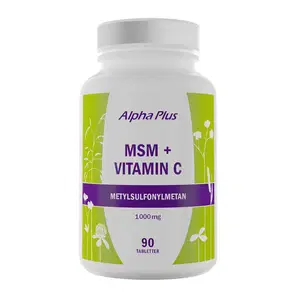Vitamin C
Vitamin C is one of our most important vitamins and antioxidants. It contributes, among other things, to normal immune function, protects against oxidative stress, contributes to normal nerve function, and is involved in the formation of collagen in the body. There are several different forms of vitamin C, and we have gathered the best and highest quality ones here so that you can find a supplement that suits you.
Common questions about vitamin C
What does vitamin C do?
Vitamin C is an antioxidant that protects cells from damage caused by free radicals. Free radicals are naturally formed in the body. This breakdown is called oxidative stress and is constantly ongoing because we are constantly replacing our cells, but it increases with, for example, hard training, smoking, stress, and sun exposure. Antioxidants counteract this process.
Vitamin C is needed to build up the body's cartilage and bone tissue as well as for normal collagen formation. Collagen is a protein that is needed, among other things, for the joints and to keep skin, hair, and nails strong.
Vitamin C contributes to the normal function of the immune system. The immune system protects the body against various stresses such as viruses and bacteria.
Vitamin C also supports the absorption of iron from food.
Extra needs may arise during
Hard physical exertion & training.
Increased exposure to environmental toxins.
Increased sensitivity to infections.
When smoking.
During stress in life.
During hormonal imbalance.
When birth control pills are taken.
Different kinds of vitamin C supplements
Liposomal vitamin C
Liposomal means that the vitamin is encapsulated in phospholipids in small bubbles. These have the property of being able to pass through the digestive system without being broken down by, for example, stomach acid. The vitamin is instead absorbed in the intestines, which can make it more effective. It is also a good supplement for those who want liquid supplements.
Acid-neutral vitamin C
Acid-neutral vitamin C is popular because it is gentle on the stomach. A mineral is added so the acid is neutralized, and it gives a so-called acid-neutral or also called buffered vitamin C. It can be called, for example, magnesium ascorbate or calcium ascorbate. The mineral also helps the cells to take in the vitamin so that it stays longer in the cells.
Vitamin C with bioflavonoids
Vitamin C interacts with bioflavonoids, which are powerful antioxidants that enhance function and increase the absorption of vitamin C in the body.
Wholefood vitamin C
By wholefood vitamin C, we mean whole food vitamin C directly from berries and/or fruit. It is available as powder or as an extract.
Can you take vitamin C daily?
Yes, just make sure to take a dose that is within the safe and recommended range. If you take too much vitamin C (more than your body can use), you will just urinate out the extra amount, which can feel unnecessary, especially if a product costs a bit more. The daily requirement of vitamin C varies depending on age, gender, lifestyle, medical history, exposure to toxins, stress, and dietary habits.
How much vitamin C can the body absorb at one time?
To actually absorb vitamin C and prevent it from disappearing in urine, it is best to take smaller doses spread throughout the day. Taking between 200 and 500 milligrams of vitamin C per day seems to be sufficient to experience health benefits. But in some cases, for example, if you feel sick or have a health condition that means you can benefit from extra vitamin C, it can really be beneficial to take 1000 milligrams per day or more, preferably divided into two times.
Which foods are rich in vitamin C?
Naturally rich in vitamin C are citrus fruits, bell peppers, strawberries, tomatoes, broccoli, cauliflower, rose hips, Brussels sprouts, parsley, acerola cherries, chili, guava, cantaloupe melon, cabbage, kiwi, papaya, red and black currants. So eat vegetables, fruits, and berries every day!
Can you notice a deficiency of vitamin C?
Yes, there are certain symptoms such as fatigue, a feeling of illness in the body, colds that do not go away, bleeding gums that can lead to tooth loss, poor wound healing, skin problems, and anemia. Severe deficiency of vitamin C can give symptoms such as sensitivity to infections.
Are you interested in vitamin C in skincare?
Then read this article.

Showing 24 of 48 products

Pureness
Pureness OptiMSM + C, 120 capsules
169 kr

Aurora
Aurora Mega-Liposomal Vitamin C
449 kr
50%
Short dated

Holistic
Holistic Pollenzym
104,50 kr 209 kr

Närokällan
Liposomal Liquid Vitamin C
329 kr

Nordbo
C-vitamin & Zink, 50 capsules
109 kr

Terranova
Terranova Vitamin C Complex
199 kr

Glimja
Acid-neutral C Vitamin, 180 capsules with 500 mg
449 kr

Global Healing
Global Healing Liquid Vitamin C, 59 ml
399 kr

Alpha Plus
MSM + Vitamin C, 90 tablets
109 kr

Garden of Life
Vitamin Code RAW Vitamin C, 120 capsules
429 kr

New Spirit Naturals
Magnum C - Acid-neutral Vitamin C
199 kr

Garden of Life
Vitamin Code RAW Vitamin C, 60 capsules
279 kr

Nordbo
Vegan D3, Vitamin C & Zinc, 90 capsules
159 kr

Holistic
Holistic C-vitamin Liposomal
429 kr

Alpha Plus
C-vitamin pH-neutral Calcium Ascorbate, 200 g
229 kr

Aurora
Aurora Mega-Liposomal Vitamin C in dosage sachets
519 kr

Pureness
Pureness Triple C-vitamin, 60 capsules
129 kr

Nordbo
Elderberry Defence, 60 capsules
199 kr

MaryRuth’s
Vitamin C Gummies
249 kr

Nordbo
Iron & C-vitamin, 90 capsules
139 kr

MaryRuth’s
Adult Liquid Vitamin C
239 kr

Alpha Plus
Vitamin C Powder Ascorbic Acid, 200 g
149 kr

Thorne
Thorne Hypoallergenic Vitamin C Ascorbic Acid
249 kr
20%

Supreme Nutrition
Camu Supreme 120 capsules
343,20 kr 429 kr
Showing 24 of 48 products